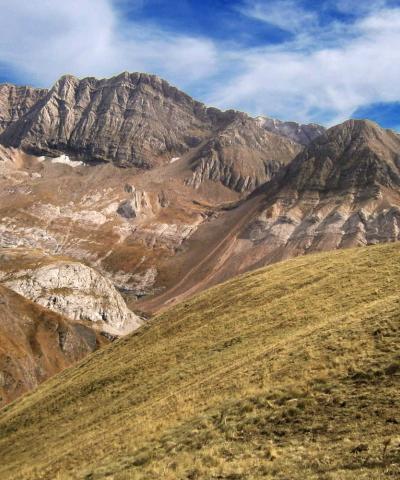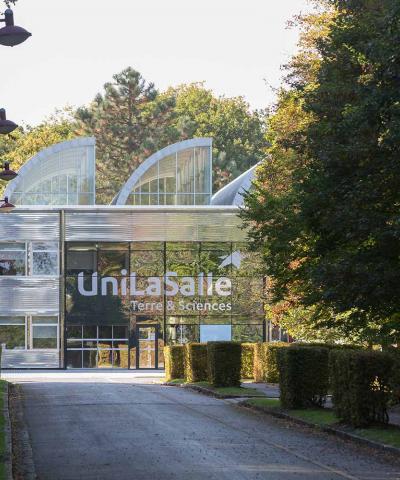A course focused on understanding subsoils and the risks they entail, so as to build sustainable, environmentally-friendly infrastructures and manage and protect water resources sustainably.
Landscaping challenges
The Landscaping and Environment pathway leads to two main orientations:
- development and management of natural hazards,
- management and protection of water resources.
These two fields are increasingly linked within companies.
The development of our territory and the management of natural hazards depend on demographic trends and our needs. Thanks to their knowledge of the subsoil and the risks involved, geotechnicians can help design new infrastructures that adapt to the territories in which they are to be built. They also have a role to play in responding to climate change issues by anticipating and assessing the natural risks we face. These engineers work with the natural environment in mind, interacting with the construction industry on both new and existing structures. They bring construction projects to life by taking into account the various risks and adapting the solutions applied to each site.
Water management and decontamination of impacted environments are key elements in the sustainable management of resources, both quantitatively and qualitatively. Given climate change, the massive use of water in our daily lives, the impact of agricultural and industrial activities in particular, and the fact that groundwater resources are limited, these specialized engineers have a major role to play in protecting and managing these resources. Their role involves observing and assessing groundwater dynamics in the field (measurements and sampling), as well as numerical modelling of these phenomena to anticipate changes in water resources and environmental issues (pollution/de-pollution).
Course details
Semester 7 - Landscaping, Water, Environment
landscaping, Water and the Environment major
The major corresponds to course-specific teaching. It consists of course sequences and projects.
- Environment and groundwater
- Geomechanics
- Project: Introductory Research Thesis 1
minors
Each semester includes 2 blocks dedicated to minors, corresponding to 54 hours of complementary teaching that enable students to complete their training in a related field.
Proposed minors
Block 1: Automated data processing : Python programming and Numerical methods, Python and advanced methods / Water Resources, Polluted Sites and Soils / Geotechnical structures / Scientific approach - Research - Beginner / Innovate, undertake and combat creaticide attitudes
Block 2: Advanced Spatial Analysis: Advanced processing of spatial data (remote sensing, Python automation, 3D, Data Model, Web diffusion) on ArcGIS / Scientific approach - Research - Beginner / Consolidate your level of English - Validate the required level
Semester 8 - Hydrogeotechnical characterization and testing
Hydrogeotechnical characterization and testing major
- Hydrogeophysical surveys - Polluted sites and soils
- Geotechnical investigations
- Project: Research Dissertation 2
minors
Each semester includes 2 blocks dedicated to minors, corresponding to 54 hours of complementary teaching that enable students to complete their training in a related field.
Proposed minors
Block 1: Logging, hydrogeophysics and borehole diagnostics / Geotechnical structures / Introduction to the Web: Developing a website / Sales techniques and commercial relations / Project management: From forecast to agile / Scientific approach - Research - Intermediate
Block 2: Management and application in RMD and Hydrogeology / Management and application in Geoenergy and Geotechnics / 3D Modeling: Designing 3D parts using Dassault Système solutions and 3D printing / Immersive entrepreneurship and design thinking / Scientific approach - Research - Intermediate
Semester 9 - "A la carte" major
In semester 9, you can choose to follow your own path, by selecting from :
- one of the two main majors in the Planning and Environment pathway, which goes into greater depth in this field (subject to change):
- Hydrogeology and Polluted Sites and Soils
- Geotechnics and Natural Hazards
- one or more opening majors, designed to broaden your skills in another field (subject to change):
- Ecological Engineering (Rennes campus)
- Numerics applied to geosciences (Beauvais campus)
- QHSE, RSE, Risk manager (Beauvais campus)
- Intrapreneurship, entrepreneurship and innovation (Beauvais campus)
- a semester, a double degree or a degree-granting stay in France or abroad (from 12 to 18 months for a double degree or a degree-granting stay)
Semester 10 - End-of-studies internship
The final project is based on an in-company work placement or research placement for students, or on the long period spent in a company for apprentices.
A final dissertation is written and presented orally.
What career options are available after completing the Planning and Environment course?
The Planning and Environment pathway enables you to work in design offices, start-ups or building and public works companies, in project management and contracting, or in public bodies, particularly in the environmental, industrial (management of water requirements and environmental impacts), mining (post-mining) and oil sectors (depollution), or in construction and public works (land and waste management).
some professions
- Environmental studies / project manager
- Environmental engineer
- Project manager in contaminated sites and soils
- Environmental engineer / site manager
- Hydrogeology engineer
- Modeling engineer
- Design engineer
- MOA/MOE support engineer
- Research engineer
- Geophysical engineer
They welcome our engineers
ANTÉA GROUP, BRGM, COLAS ENVIRONNEMENT, GINGER BURGÉAP, GROUPE GÉOTEC, HPC ENVIROTEC, MINISTÈRE DES ARMÉES, ORTEC SOLEO, SOCOTEC, SOLER HYDRO ET SOLER ENVIRONNEMENT, STRATÉGÉO, SUEZ EAU France ET SUEZ RR IWS REMEDIATION, TAUW, VALGO, VÉOLIA, BOUYGUES, CEA, CEREMA, COLAS, EDF, EGIS, ENGIE, FONDASOL, GEOTEC, GINGER-CEBTP, HYDROGEOTECHNIQUE, INERIS, RATP, SIXENSE, SNCF, SOLETANCHE-BACHY, SPIE BATIGNOLES, TECHNOSOL, VINCI



